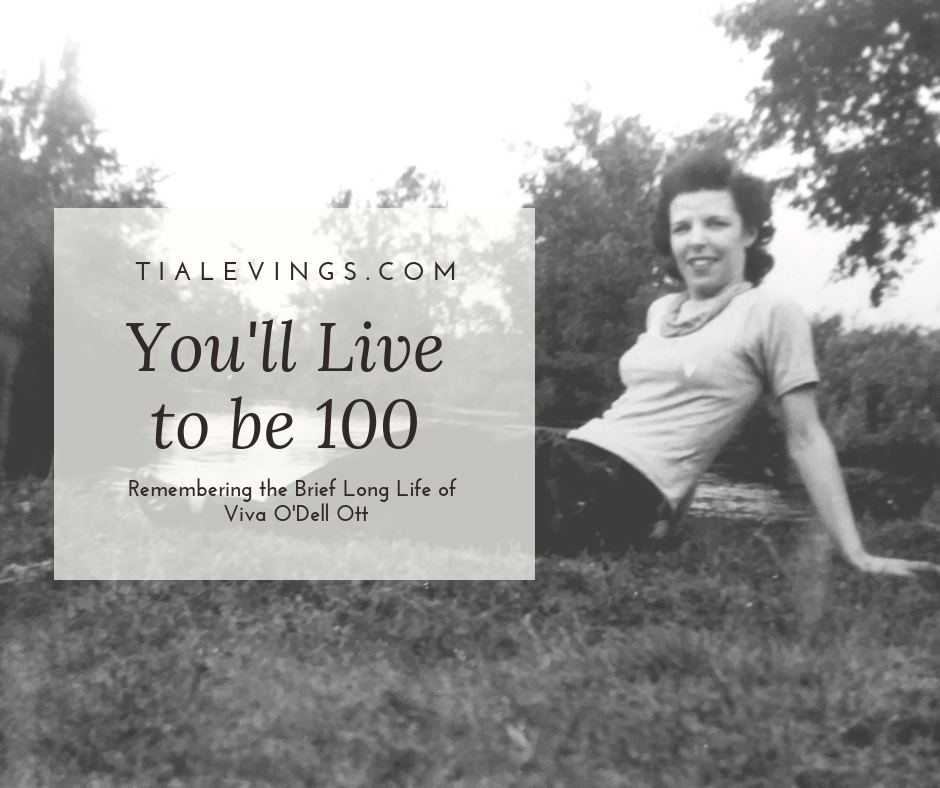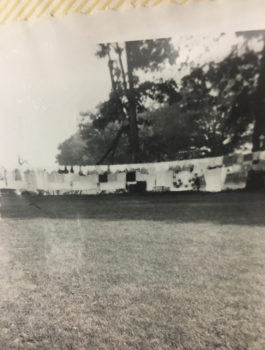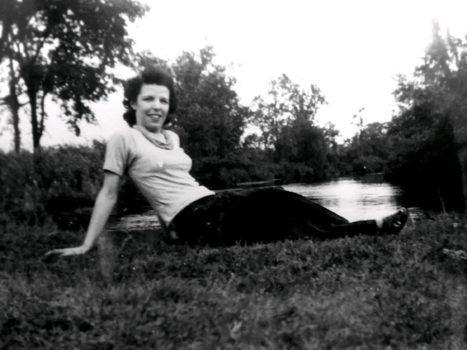
You’ll Live to Be 100: Remembering the Brief Long Life of Viva O’Dell Ott
My grandma died this morning and I’m trying to imagine the world without her. This is odd to me, and unexpected, because my “Gigi” (so named after she became a Great Grandma over twenty years ago) hasn’t been an active part of my life for nearly a decade, and we’ve known for awhile that her time was going to end soon. She spent her final years on the other side of the country, allowing her to “spend time with my other grands,” she said, and when she did so, we gradually communicated less and less. When she made the move back to her home state, the family knew it was her final move and that eventually, she’d achieve her lifelong wish and die so she could see Jesus.
For as long as I can remember, my Grandma has talked of dying soon to go see Jesus. The trouble was, she was in good health and possessed a stubborn streak to see “what’s up” deeper than the river at the bottom of a vast canyon. It’s difficult to die when you aren’t fatally ill and want to know what’s going on tomorrow. She finished up in a nursing home, sleeping after days of no longer eating, no longer drinking, no longer speaking. At some point, I think she stopped caring about what would happen tomorrow. She’d seen all she’d cared to see.
“Let me go see Jesus,” they say she said.
She was ninety-nine and a half. That’s partly why I can’t imagine the world without her. The last time the world was with out Viva (her name even means life) it was a very different place. World War 1 had just ended. Women’s suffrage passed in congress. The flu epidemic was over. The most common car was the Model T and air traffic meant biplanes and airships. Woodrow Wilson was president. The Great Depression hadn’t happened yet.

My grandmother was a child during the Roaring Twenties and an adolescent during the Great Depression.
For my entire life, she was in my world. We struggled, she and I. Early on, I understood I wasn’t one of her favorites. We have the same stubborn streak. I suspect, the same genetic melancholy as well. And, as I discovered in her last letter to me, the same writing dreams. She often told me I wore my mother out too much. She could be mischievous, opinionated, and sometimes rude. She was devout, disciplined, and devoted. She had a sass tongue sometimes touched with vinegar, and a sweetly sentimental heart. When she wanted to do something (or not to do something) she couldn’t be moved. Grandma was indomitable. Small, but fierce. It’s still easy for me to picture her stubbornly walking to the grocery store well in her eighties, even on a hot day that would reach a hundred degrees, because she wanted to be in charge of her own food.
Grandma and I bonded over our mutual enraptured delight in the moon, a gorgeous Autumn, the smell of woodsmoke and wet leaves, and the vibrant color of changing trees. When I was a kid I stayed the night in her apartment on Fridays and we ate popcorn with cranberry juice and worked puzzles (she must have completed thousands of puzzles). We watched Wheel of Fortune and played Scrabble. She liked it when someone offered to scratch her back in all the places she couldn’t reach. On Sundays at dinner she made jokes about our weight and talked about going to heaven.
When I was a little girl, raggedy around the edges and usually barefoot, she came to live with us for awhile. She washed the dishes after dinner and walked in my mother’s rose garden at twilight. I had been trying to get on her good side but she was at our house because she’d been having a hard time of life, going through things children didn’t understand, and her “good side” seemed elusive and bony. The summer air hung heavy with stress and my mother sighed a lot. One day my grandmother snapped at me and said, “You are just like your father!” This was not a bad thing to me. I wondered how it could be to her. I went in the shop and built her a wooden robot, “So it can do the dishes for you, Grandma.” She laughed and relaxed for a minute. Whatever the summer was meant to do, it must have been doing. She gave up her car and moved to Florida, to live with my Uncle. She said she didn’t need a car in heaven anyway. She sent photos of her walking on the beach with him, gathering shells, wearing large floppy hats. In my world, but in the shadows. That’s how it most often would be.
“Tell me what it is you plan to do. With your one wild and precious life?” — Mary Oliver
Ironically, I felt the closest to her in the years when she was most far away. For twenty years we lived in the same city and saw each other every week. She was a big part of my children’s lives when they were small; she adored them. I often said my daughter was Grandma’s favorite thing about me. She was an institution in our lives, at the table for every holiday and Sunday dinner. But that’s not when I felt the most kinship with her, talking over ordinary things, taking her grocery shopping, scolding her for taking herself up to the mall alone– a wee elderly lady hopping the city bus to go browse at Dillards, or asking her about her new puzzle. No, it was in the years of my own hardships and suffering when I discovered her cells in my spine, when I drew on her experience to push through my own private war. That was when I knew who I came from and what I needed to do get through. I felt closest to her when I needed to silently draw from her strength.
My mother was her baby, her final child. She was born the year polio swept the nation, the year The Diary of Anne Frank was published and the Today Show debuted. The skies now included the first passenger jet. A second war had ended. Queen Elizabeth II ascended the throne. Her three youngest children came, “boom, boom, boom.” They might be Irish triplets, I don’t know.

I recently read that females are born with every ovarian egg they will ever have; their eggs form in the womb as they develop. When I read it, I marveled at the Babushka doll idea of it. The egg that made me, inside my mother, while she was forming inside my grandmother’s body. Part of me understood then why my soul has always felt old. Why I feel ordinary moments in our history as if they were my own. Part of me, the egg that made me, was there. My egg lived through the fifties, sixties, and seventies. My egg experienced the stress, pain, happiness, and joy of my grandmother’s and mother’s ages.
I also read that when a pregnant mother experiences stress or pain, her fetus and placenta send empathetic cells to help heal her. If her heart is stressed, her child’s cells will go there and grow. They stay there after the birth, forever. She literally carries her children in her heart.
There’s a story my grandmother used to tell, of life with my Granddad when they lived in “the trailer.” They were poor then, my Granddad younger than she, a war vet, and in between jobs. By all accounts their relationship was volatile and erratic; my Granddad not always coming home or saying when he would, not always giving her the money he’d made. She lived uncertainly, desperately making dollars and potatoes stretch. The Depression was long over by then but I think for my Grandma, depression never was.
“I hung all the laundry on a clothesline, even in winter. The diapers and blue jeans would freeze solid. My fingers would get so cold! We’d bring them in to warm up by the stove.”
Those years include waffles for dinner. So many potato pancakes that my mother won’t go near one ever again. Homemade clothes. Regular church attendance. The hope of a heavenly kingdom where suffering is no more.

Her lines of diapers and laundry in summer, when using a clothesline is sweet with sunshine.
I took from her stories perseverance. Grit. Fortitude. Survival. I used them when I had ten dollars to feed my family of six for a week. I used them when my own fingers froze from cold days with a winter clothesline. I used them when driving my children through the night towards our freedom from domestic violence and addiction. I thought about her loneliness and how having to be the strong, steady one transforms a person, especially when maybe they don’t start out feeling strong and steady inside. Her cells inside my body. My egg inside of hers. Hearing her stories seemed to explain why her hair went white in her thirties. It made sense why she had little patience with men. It made sense to me she had her eye on the prize ahead, a heavenly kingdom, an eternal life without the pain of this world.
What I never understood was how ready she was to go, so early on. It became a family joke that Grandma would say, “Well, I’m going to die soon.” She’d use it as a reason to resist some self-care kind of thing my mom wanted her to do, such as, “I don’t need to replace my dentures because Jesus is going take me soon.” She knew none of us could argue with the sudden rapture of Jesus Christ. When she was in her sixties I started arguing with her about being comfortable and treating herself a little. “You’ll live to be 100,” I’d say. “You’ve got decades yet to go. You deserve to have comfortable dentures.” My mom urged; Grandma resisted. I’m forty-four as of this writing and my Grandma has been ready to go the entire time. She never did buy herself new teeth.
She did very little for herself, even when it was necessary. I don’t know if it’s the family tradition of female martyrdom, or the extreme frugality carried over from the Depression era, or related to self-worth and “deserving” good things. She just always said that it was because whatever the item in question was, she wouldn’t be using it for very long, because she’d be seeing Jesus soon, and that was supposed to settle the matter. She’d button up and refuse to talk about it any longer so yes, that settled it. We had to give up and move on.
But for so long, I was right, and she pressed on towards one hundred. The family would share some fresh malady she was experiencing, like when she had to give up her Facebook account because of hackers or had to give her computer up because she fell prey to too many virusy downloads. Or, when her eye sight failed and then her hearing. Numerous bouts of pneumonia. Infections. Coughing spells.
Gigi would step up the death talk and the rest of us would say, “Okay, but is she still eating cheese popcorn?”
“Is she still drinking Ensure?”
“Does she still wonder what’s going on down the hall?”
“Is she eating?”
“Is she drinking?”
“Is she being given morphine?”
I really believed she’d see one hundred. It’s only a few months away. She’s pulled through worse pneumonias. She made it through another Michigan long winter. I never thought she’d die in Spring. January, maybe. For decades now, every time she said she wanted to die and go see Jesus, she’s had years left to wait. She had ninety-nine autumns. Her lifetime went from airships to spaceships. Electric homes to electric cars. From suffrage to women in congress.
Her last letter to me came a couple of years ago. I’d sent her my first collection of short stories, my first attempt at publishing my work. I remembered how when I started blogging, she’d print out every single one so she could read it and hold it in her hand. I thought that was funny then– “It’s all online forever, Gigi!” But it wasn’t. I took that blog down one day. Her paper copies are part of all that’s left.
I thought she’d get a kick out of my little book, imperfect as it was, and I was right, she did. But her letter surprised me. She told me how she’d once had dreams of becoming a writer, how she’d once given it a try. And then due to different times, and so many children and so many hardships, she never did. She hoped that I would. She was cheering for me, she said. It felt a little like she was adding her effort to mine, passing on the baton. And since I was born in a different time with different opportunities, maybe I could accomplish what she never could. That letter opened a window I’d never seen opened before.
I knew in that moment that my grandmother, Viva O’Dell Ott, had an entire interior life I knew nothing about. The institution I’d known my whole life had closed doors that rarely cracked open widely enough to see what was inside. She had dreams and goals and secrets. She’d tried things and failed, tried things and succeeded. She liked walking in the woods, going to deer camp so she could see the autumn leaves, and solving finite puzzles with pretty, finished solutions. She had a sharp mind and a fertile imagination. She raised four children against incredible circumstances. Sometimes the challenges ate her. Sometimes she conquered them. There were stories behind all those opinions but who in the family knows them? Maybe only Jesus. It seems an incredible loss to me that I don’t have any of her stories written down, in her hand, in her voice. Where did that Viva go?

We both would have loved this perfect day.
I’m trying to imagine the world without my grandma and I’m having a hard time. That it’s going to take time to get used to should not be odd to me, it’s only been one day in 36, 315. Ninety-nine years seems like a long life. Through the lens of technological advancements, it seems like a lot of history has passed. Considered as just over thirty-six thousand days, the brevity of it catches my heart.
“I carry your heart with me (i carry it in my heart.) — e.e Cummings
Leave a Reply
You must be logged in to post a comment.

